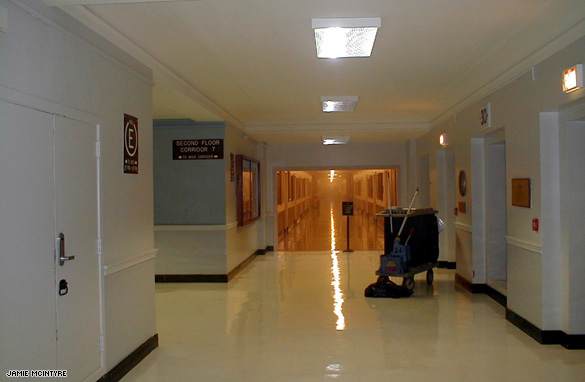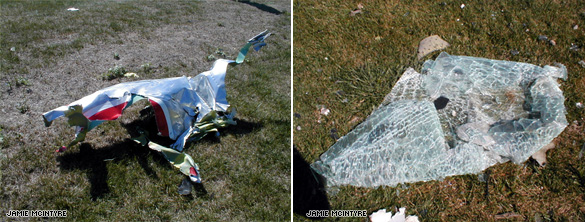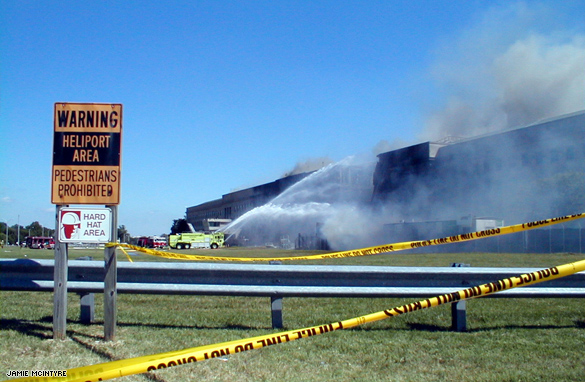Oyster Bay, as all of the Manhattan Metropolitan area is getting to know the people lost in the terrorist bombing of the World Trade Center on Sept. 11. Most of us watched the events as they happened on television. Now we are seeing the depth of the loss as we attend the memorial funerals of those people whose lives were unforgivably ended.
Local people lost in the tragedy include, Christopher Paul Slattery, 31; Timothy Byrne, 36; Brooke Jackman, 23; Bernie Patterson, 45; Michael Taddonio, 39, Edward Papa, 47. At St. Dominic's parishioners also prayed for the familes of: Joseph Kelly, Thomas A. Mahon, St. Dominic Class of '82; Danny Tran, Robert McMahon NYFD; Frank Sedaka; Christopher Ciafardini; Bart Ruggieri; Timothy Haskell NYFD, Squad 18; Thomas Haskell NYFD, Lad 132; Thomas Langone NYPD ESU; Peter Langone NYFD; Timothy Higgins NYFD; Laura Marchese; Thomas Strada, St. Dominic Class of 1978.
Thursday, Sept. 20, there was a large memorial Mass for Christopher Slattery. Friday, it seemed there couldn't be a larger group of mourners at St. Dominic Church, for the service for Timothy G. Byrne St. Dominic Class of 1983, but Saturday, the church was overflowing for the service for Edward Papa. Sunday the Oyster Bay Jewish Center mourners filled the sanctuary, the social room and spilled over outside as they listened to a tribute to Brooke Jackman. There were between 1,000 to 1,500 people in attendance. As we go to press on Monday, the Mahon family is honoring their loss of their son/brother Thomas. The grief appears to be growing as Americans come to grips with the toll of the attack.
At the St. Dominic Memorial Mass for Timothy Gerard Byrne his brother Sean spoke, with his brothers Brian and Christopher standing with him.
Sean Byrne thanked Dan Driscoll, Tim's best friend and Bill Hickey, a friend and co-worker at Sandler & O'Neill for speaking. The company, that was located in the World Trade Tower, lost 67 employees.
On behalf of the Byrne family, Sean offered their deepest sympathy to all the families affected by the tragedy. The wife of the company's CEO was also widowed in the attack.
Mr. Byrne also expressed the family's gratitude of the last few days. He said it shows the quality of the people of Oyster Bay.
He said, "There are thousands of sad stories to tell. Ours is certainly one of them." He described Timmy as 36, the third of 10 children in a family of nine boys and one girl. Timmy rose to become the head of the family when his father died of a seizure in 1986.
Mr. Byrne had asked his mother to characterize Tim, and she had said him, Tim was a very smart, bright little boy, a bundle of energy and his favorite saying was "I can do it." As a toddler, in his playpen, he managed to get out and drag the playpen down the street.
One of his greatest gifts was his ability to connect with people, it made him a part of everyone he met, said Sean.
"This made him a favorite of teachers, friends and friend's parents as well as at college and work," he said.
In his eulogy, his brother Sean Byrne said when he was notified of his father's death, he came home from Maritime College and spoke to Timmy at Syracuse University. "He was crying saying what are we going to do?" Sean said they'd be okay.
Between the phone call and getting home Timmy had a plan. He was a born leader and the other siblings saw that he would take over the role of the man in the family. He continued his own education, getting his degree at Syracuse and then an MBA at St. John's in 1992, with a 3.2 gpa.
Sean told the story of how Tim got into Syracuse. "He was excellent academically and athletically, not without effort: he worked out hard and studied diligently. At the end of his senior year he wanted to show he could play division A football. He wanted to play for Syracuse. He sent a letter to the coach, "And mother sent one, as she did for so many of her children," said Sean.
"He was offered a tryout after the season ended. During the summer Timmy lifted weights and ran six days a week. Out of 35 who tried out, he made the team. It was one of the happiest days for the family," said Sean.
Timmy was the head of the "Byrne Corporation." At one time, he left his NYC apartment to live with the family as a budget strategy. "Knowing how much he loved his apartment, you could see what a selfless human being he was," said Sean.
The family had fireside chats to discuss family issues. "Timmy gave out a Lotus spread sheet to explain 'this is the net net.' Sometimes the fireside chats got hot," he said.
Things changed and he returned to having his own apartment, but he continued to help the family and help with the education of his siblings as they attended college. His brother Colin is a sophomore at Notre Dame on an academic scholarship.
"Without Tim's leadership, guidance, and sense of humor, my family would not be in the position it is today," said Sean.
He said, "The world was a better place with Timmy. If everyone lives out their lives to the fullest and soars to new heights then Tim will go on forever. A hero in living: his passing brought nothing but honor to the Byrne family.
"Tim is in heaven giving my father golf lessons," said Sean. "God Bless American. Thank you for coming."
The first speaker at the service was Timmy's friend Dan Driscoll.
The two met at St. Dominic's. "I believe when someone is as special and unique as Tim, leaves this world, he takes a piece of us with him and we are forever changed - and he leaves a piece of himself here."
He said, "I thought of Tim as a prince. He most definitely was the Prince of his family. I never met a man who brought more peace than Tim, brought more happiness.
"But all sorrow is not what Timmy would want. Tim would have been disappointed if people let his death affect them."
Mr. Driscoll gave a message of hope. He said when thinking of that day, Sept. 11, don't think of it as a day of endings: think of it as day of the beginning of our new life.
Mr. Driscoll said, "I could never keep up with him. He always had 100 things going. Timmy's favorite saying was: "I'm getting it done, John, getting it done. I'm in the trenches getting it done."
He said, "Tim was a mover and shaker and always had a back up plan.
"I'll never stop missing Tim. I'll always have him here in my heart," said Dan Driscoll.
Bill Hickey, a friend and co-worker at Sandler & O'Neill spoke next and said from the first day he started, they became great friends. Tim formed great relationships with people.
The family chose I Was Born to Be an American God Bless the USA to be played as the memorial ended.
The family has established a memorial for Timothy, which will benefit the St. Dominic Playing Field entrance garden. Donations to the Timothy G. Byrne Memorial Fund checks may be made payable to St. Dominic High School.
Oyster Bay High School graduate Brooke Alexandra Jackman of the Class of 1994 was also in the World Trade Center when the hijacked airplanes crashed into the buildings. Brooke worked on the 104 floor of WTC-1 at Cantor Fitzgerald. That company lost 700 employees that day. Brooke was 23.
The Oyster Bay Jewish Center sanctuary was filled and the crowd spread to the social room and spilled outside. The tribute service was heard in all the areas. Her family shared their memories of Brooke. Of the three children, she and her sister Erin, and brother Ross, Brooke was the youngest. Her father Robert Jackman was on the Oyster Bay-East Norwich Board of Education and was able to present her with her high school diploma. They said he was surprised by the number of honors she won that day, she never told them beforehand. She was a perfectionist. They said she never thought of herself as smart - that although she could remember dates and events with great alacrity. Brooke was a great keeper of secrets, said her sister - the two were very close. She had a great relationship with her mom, they traded books and were shopping buddies.
Barbara Jackman said Brooke was able to argue with her dad because they were so much alike. "She had her own opinions," her father said proudly.
Brooke was thrilled to have a sister-in-law, Iris.
Brooke volunteered at a community soup kitchen in Hicksville, at the Henry Viscardi School, and at the Daffodil Cancer Thrift Shop in Oyster Bay.
Susan Diamond sang You'll Never Walk Alone at the family's request.
Her brother said, "The past is not a place we can visit. Brooke, we will cherish you in our hearts, your beautiful smile."
Brooke's family has asked that in lieu of flowers donations be sent to the Brooke Jackman Foundation, P.O. Box 354, Mill Neck, NY 11765. It will be used to benefit children in need.
Mrs. Jackman said Brooke had just been accepted into the Berkley School of Social Work at Columbia University. She had told her mother, "There is more to life than just making money."
Other families in the community are thinking of the others in this tragic time.
Michael Taddonio's family has asked in lieu of flowers, donations can be made to the Michael Taddonio Memorial Fund, 155 Pound Hollow Rd., Old Brookville, NY 11545.
Christopher Paul Slattery's family has asked in lieu of flowers, memorial donations can be made to Cantor Fitzgerald Relief Fund, the NY Firefighters 9/11 Disaster Relief Fund or the September 11 Fund in conjunction with the United Way.





